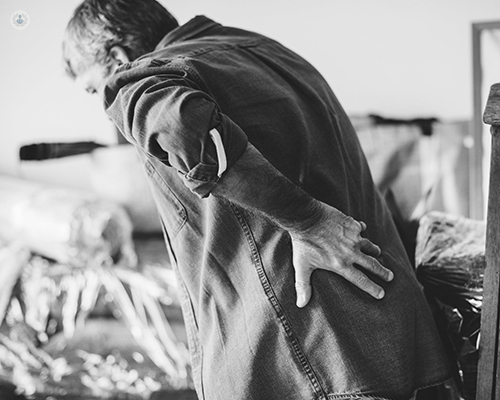Slipped disc: how painful is it?
Autore:The bones that make up the spinal column are cushioned and protected by discs that absorb the shocks which may occur from everyday activities, including general lifting and twisting. A slipped disc, or spinal disc prolapse, can cause pain and discomfort if it becomes weak or compresses one of the spinal nerves.
We’ve asked one of our expert neurosurgeons Mrs Anne Mitchener to explain what happens when a disc prolapses and whether everyone is likely to experience pain.

What are spinal discs?
Spinal discs are cartilaginous (fibrocartilage) structures between the bones (vertebral bodies) of the spine. They have what's known as outer annulus fibrosis, which is similar to a tyre and an inner annulus pulpous of softer consistency. Spinal discs are of a rubbery consistency when healthy and they are softer when degenerate or diseased. The tyre can bulge and cause symptoms and the inner pulp can break through and herniate, causing similar problems.
The discs permit flexibility between the bones but restrain the movement to hold the spine together. They are avascular, which means they rely on blood supply and therefore oxygen to diffuse into the edge of their structure from local capillary blood vessels. They do not regenerate but they may recover when they are damaged.
What happens when a disc prolapses?
There is often back and leg pain but only if the disc herniation touches the nerve as it exits the bony spinal canal. This pain can be constant or it can be intermittent according to the movement because the disc perhaps only touches the nerve in certain positions. When a disc prolapses the following may occur:
- Pain is felt on the side that the disc prolapses towards.
- The distribution of the pain in the leg tells the specialist which spinal disc level has likely herniated.
- The disc may be a bulge that recovers, shrinks from an acute swollen state, to allow pain to disappear.
- The disc may be sequestrated and either break off and get stuck against a nerve (often in a small bony nerve root canal) or remain attached to the disc and get similarly stuck to a nerve.
- Then the pain persists.
What are the symptoms of a slipped disc?
You may feel the following pain:
- Numbness – altered/reduced sensation when touching the skin.
- Weakness – such as foot drop.
- Paraestheiae - also known as pins and needles
- Loss of proprioception - unsure where the foot/leg is resting when not looking at it.
Is a slipped disc always painful?
No, not in every case.
Who is prone to getting a slipped disc?
Anyone can be prone to a slipped disc but there are believed to be some genetic dispositions, which are not yet clarified scientifically. No particular job or sport is responsible for isolation.
How can I avoid having a spinal disc prolapse?
Maintain core body strength with exercises that can be obtained from a physiotherapist.
Do not hesitate to book an appointment with Mrs Mitchener if you are concerned about any persistent back pain.


